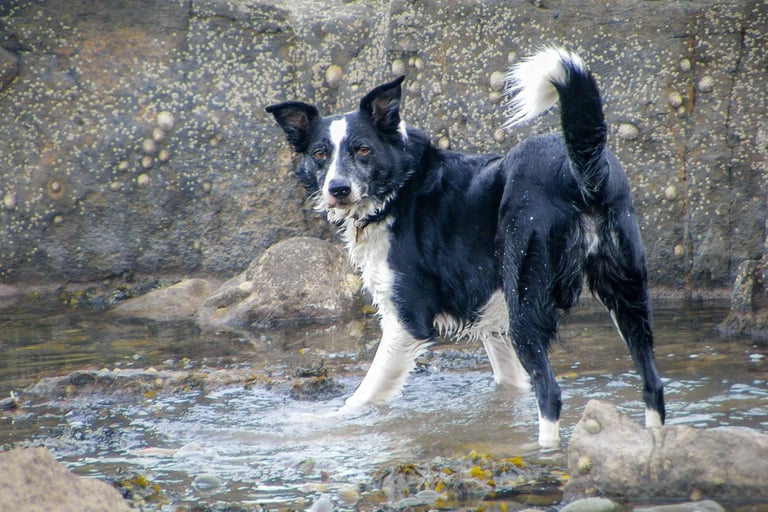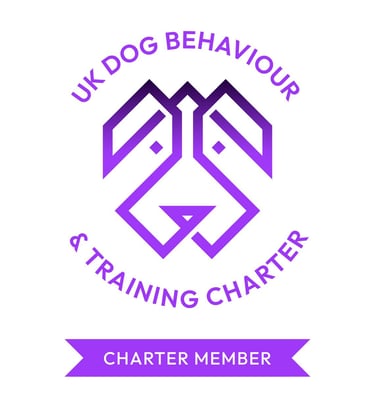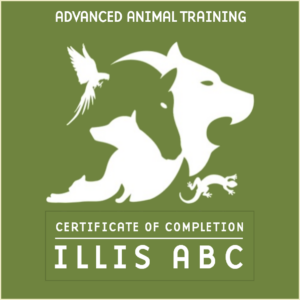Qualifications and experience
I have been independently assessed in order to be affiliated with several nationally recognised dog training and behaviour organisations including:
Association of Pet Dog Trainers UK - Member No. 369
Kennel Club Accredited Instructor in Companion Dog Training
Animal Behaviour and Training Council Registered Animal Training Instructor
Pet Professional Guild Professional Dog Trainer
Association of Pet Behaviour Counsellors Academic Member
KC Listed Status for all levels of the Good Citizen Dog SchemeKC Examiner for all levels of the Good Citizen Dog Scheme
As well as a Professional Graduate Certificate in Education (PGCE), I also hold several accredited qualifications in dog training and behaviour including:
HNC Canine Behaviour & Training
APDT ‘Kind, Fair & Effective: practical skills for dog training instructors’ Certificate
COAPE ‘Think Dog!’ Certificate
BBC/IABTC ‘Canine Behaviour Problem Counselling’ Certificate
Advanced Diploma 'Canine Behaviour Management'
Like all good dog trainers, I am fully insured and I regularly attend courses, workshops and seminars dealing with many different aspects of dog behaviour and training, as well as reading all the latest scientific publications, in order to keep up-to-date with the most recent advances in animal training and behaviour modification.
I hold several certificates in instructing and, as well as more than 30 years of instructing in dog training, I have 40 years experience in teaching adults in colleges and universities. I'm a full-time lecturer on all of the canine and animal training and behaviour degrees offered at University Centre Bishop Burton Foundation and the Programme Leader for our Masters degrees in animal training and animal behaviour.
Training philosophy


Just Pet Dogs believes that training your dog is about mutual respect, understanding and good communication. Dog training has changed enormously in the past 30 years. It is no longer considered necessary, or acceptable, to use harsh methods in training, and the use of evidence-based, motivational methods are as successful as they are enjoyable to use. The focus of modern dog training is on helping the dog get it right, and rewarding him when he does, rather than reprimanding the dog when he gets it wrong: this results in a dog that is happy to do what you ask rather than being bullied into doing what you ask.
Just Pet Dogs does not subscribe to ideas of having to be 'pack leader' or 'alpha' or 'dominant' over your dog or the idea that your dog will try to be 'dominant' over you. Alas, these ideas continue to proliferate in the popular dog press (books and magazines) as well through a multitude of television programmes, and have been used as the basis for ‘solving’ almost any problem that your dog might exhibit from simple training issues (such as pulling on the lead or not coming back when called) to serious behaviour problems (such as clinical separation anxiety and severe aggression). However, there is no scientific evidence to support these theories: in fact, the vast majority of the scientific study disproves these ideas.
There are many reasons why dogs don't do what their owners want them to including lack of training, previous experiences of punishment, fear and anxiety or even medical issues. They have nothing to do with the dog trying to be being 'dominant'.
Why I became a dog trainer
I began training Bracken, a farm-bred Border Collie bitch, in 1995. When Bracken was about six months of age, I began attending my local dog club and was soon invited to become an instructor at the club. Unfortunately, Bracken developed aggression issues towards dogs and, eventually, towards me. As a result, I began to educate myself further about canine behaviour and training and found that the training techniques I had been taught to use were what had created and maintained the problems.
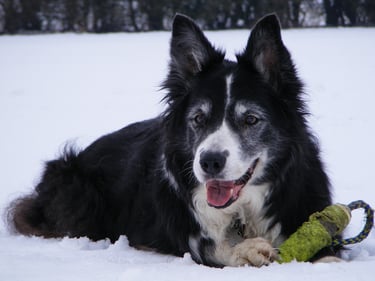

With guidance from a member of the APBC and practical help from a member of the APDT, I began to solve Bracken's aggression problems. During this time, I travelled twice per week from Hull to Lincoln to attend a training class that used modern, positive reinforcement based training methods rather than old-fashioned, punishment based methods because there were no similar classes any nearer.
With the continued support and encouragement of my two mentors, I established Just Pet Dogs in August 1997, running my own classes in Hessle and providing training and behaviour advice. In October 1997, I was assessed and accepted for membership of the APDT, an organisation that I am proud to belong to for it's modern approach to dog training and it's stance against punitive methods.
Since then, I continued to educate myself through undertaking the few science-based courses that existed at the time and attending whatever seminars and conferences I could, ultimately leading to me teaching degree students about animal training and behaviour.
My Dogs
Bracken
You've already met Bracken briefly in the section on 'Why I became a dog trainer'. Over the years, Bracken and I dabbled in obedience, agility, flyball and heelwork to music. As she got on in years and developed arthritis, the physically demanding sports fell by the wayside and we focused on gentle tricks and assistance tasks (fetching and carrying around the house, e.g. newspapers, TV remotes, peg buckets for the washing, etc.) although she did pass her Kennel Club Good Citizen Dog Scheme Bronze Award, at twelve and a half years of age!
After nearly three years of fighting cancer, Bracken finally gave up the fight in January 2011, at the age of fifteen and a half years. She was vital until the end but let us know it was time for her to go. She was an exceptional dog who had a massive impact on my life and is still sorely missed.
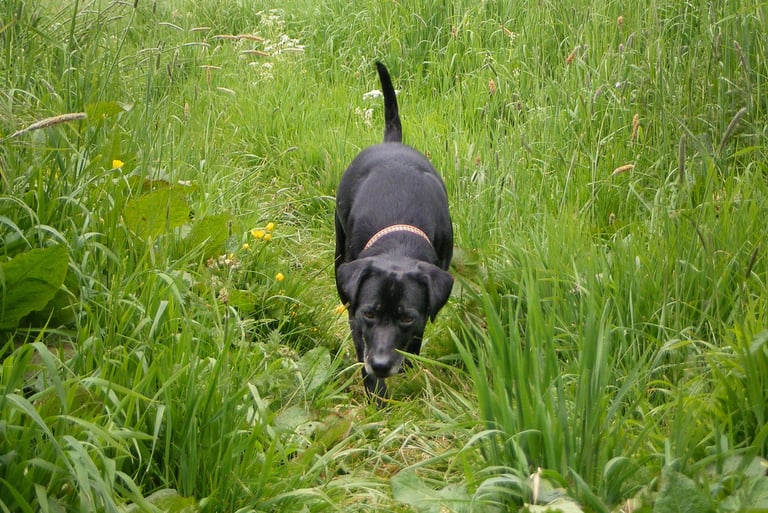



Penny
Penny, another Border Collie, came along as a 14-month-old failed farm dog in 2012 - she was supposed to work the cattle, but just doesn't have the strength of character for the job. I took her on knowing that she'd never lived indoors, so wasn't house-trained, didn't know how to walk on a lead, and was a bit scared of traffic. What I hadn't planned on was that she was terrified of everything in the house: doors moving, the sound of the kettle boiling, the sound of the washing machine, getting into the car...she was even scared to play in front of us! It took a long time for her to get comfortable with us, particularly with playing, but fortunately she loves people and is now very comfortable with her life.
Hovis & Cherry
I obtained Hovis & Cherry in 2001 from Hull Animal Welfare Trust. They were Labrador crosses possibly with some hound in the mix: Cherry looked like a small Labrador but Hovis, her litter-brother, was rather hound-like in looks and behaviour. Unlike Bracken, they were only ever trained using positive reinforcement based methods including a lot of clicker training. They both did a little agility and had a wide repertoire of tricks and heelwork to music moves. Cherry left us after a long illness in 2014 - she was stoic to the end. Hovis left us just a couple of weeks before his 15th birthday in 2016.
